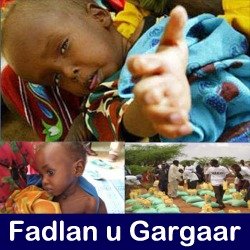Who’s to blame for the hunger and the famine in Somalia?
Almost every day, leaders and aid organizations, coming from the entire world, are arriving in Mogadishu to study and assess at first hand the refugee situation severely hit by draughts, the malnourished children dying different types of diseases In order to get the solution for this horrific and unbearable disaster which is consuming this people that has not seen a drop of rain for the past two years.
Thousands of people, mostly children, have died and continue to die. Several delegations from different parts of the world continue to land into Mogadishu airport, not ignoring the risk they were running every minute that passes. They are here to analyze the condition and see with their own eyes the tragedy that was unfolding every day in this part of the Horn of Africa.
The international donors and UN together are showing a lot of effort in order to provide food and medicine for more than 3.7 millions of refugees in Mogadishu alone, but some are coming late and in a slow motion.
The world body knew that Somalia didn’t have enough rain for the last two years and they were watching without taking any preventive action and preparing for what everyone now calls a critical stage.
Prior to 1991, is known that Somalia politically wasn’t a great democracy, but was capable of producing enough food for its people and the business community were making enough profit on agricultural crop and livestock was alive and safe.
After that year everything precipitate in abyss and it took 20 years to get where Somalia is situated now. According to some expert, the lack of rain doesn’t have anything to do with the humanitarian disaster in Somalia. As a nomadic society and pastoral community, Somalia could survive drought, as it did through the centuries, but famine, in this case, is a man made.
The famine is the consequence of armed and violent conflict in the last 21 years and has its roots on lack of peace and stability, weak government, lack of national identity, civil war and various conflict based on clan and religious alliances.
Today, Somalia is not better looking than yesterday, if is not worst. The political struggle is still here with a new face and a new mean.
In front of the TFG is a big challenge in order to make sure that aid arrives to all the regions of the country, protect its workers and take into custody those who are stealing aid stock to sell in the open market like Xamarweeyne, Bakaara and Suuq Bacaad.
Days ago the government stated that it has created a special force to protect the humanitarian aid and oversee how the distribution is done. But the problem is that the TFG can’t control its soldiers because they are originally from clan militia and are not disciplined; in another word they’re “untouchables” and they know that they can count on their own clan, not on the government. Almost every day in Mogadishu, soldiers shoot famine victims and kill a number of them. That’s why the soldier’s uniform is loosing respect within the famine victims.
The United Nations should assist the government to create an organized civilian police force and disciplined military army that can protect the people and maintain the order if needed.
The way things are going these days like killing innocent famine victims, intimidate women and children just to steal the humanitarian aid stock, will lead the appearance of a new generation of warlords who will be more sophisticated than their predecessors.
According to the BBC, the British’s international development secretary, who came in Mogadishu, left this message to Somalia Prime Minister Abdiweli Mohamed Ali: “You deliver stability, and hold your ministers to account, and we’ll continue to engage in the long term.”
This is the biggest challenge facing the TFG in general and the Prime Minister in particular.
The question in Mogadishu these days is: Who’s to blame for the hunger and the famine in Somalia? Some Somalis blame all these together: weather, lack of national identity, the international community and the lack of security and stability in the country.
_________________
Ali Omar Ghedi (Ali Garabey) is a member of the Diaspora and Member of the Transitional Federal Parliament
He can be reached at Email: alighedi@yahoo.ca




































comment closed after 30 days / Jawaabaha waa la xiray ama waa la joojiyay wixii ka badan 30 cisho.